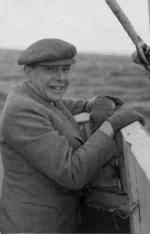Hambro's invitation to Buchman in the early thirties arose from his realisation that political and economic measures were not sufficient to counter nihilism and a totalitarian faith. Yet he knew that any attempt to redirect the national thinking would meet with resistance, from which he naturally shrank. He also feared the financial cost of such an operation.
In August 1934 Buchman wrote to him, 'In all our planning we must think through all of Norway and the Nordic countries and the part they must play in world reconstruction. I do not think we need fear the publicity. You are accustomed to an Opposition and after all it is an opposition that may be won, because unless they see the need of a world-wide spiritual front, they themselves may have an anti-God movement at their doors which will be far more subtle and devastating; while this carries the constructive answer, as you well know, to the problems of the modern world. I beg of you to have no concern about finances and we need not now decide on numbers. We shall see eye-to-eye as things develop, but "Have no thought what we shall eat or what we shall drink." Our Heavenly Father will look after these things for us.'4
Hambro invited 120 of his friends to meet Buchman and thirty companions at the Tourist Hotel at Høsbjør in early October.
'What is going to happen up there?' Frederik Ramm, a renowned editor who had been the only journalist with Amundsen in his flight over the North Pole, asked Reginald Holme as they travelled together.
'Miracles - and you will be one them,' replied Holme.

Norwegians like plain talking, and Holme's prediction turned out to be true.
'At Høsbjør God extinguished all hatred and all fear in my relations to other people, classes and nations,' Ramm wrote later.5
Ronald Fangen, the novelist, brought two bottles of whisky and a crate of books, expecting boredom. He did not find time to open either. His change was immediately visible and long remembered. The lyric poet Alt Larsen, even twenty years later, spoke of the 'hopeless naivety' of the Group's philosophy as compared with his own anthroposophy. It had however completely transformed Fangen, who before that, in his opinion, had been the most unpleasant man in Norway.6
Eighty journalists turned up, and as they spread the news of what was happening at Høsbjør, more and more people came until every bed was filled for miles around and some even slept in their cars. By the second weekend, the number of guests had grown to 1,200.
'I don't know when Frank, or any of us, have laughed so much,' Loudon Hamilton wrote to his wife. 'Hambro is a continuous fund of really first-class yarns.' Four days later he added, 'A remarkable feature has been the way individuals and groups have been reconciled. Church divisions are very deep in Norway. But here they have become united. Two leading theologians detested each other. They were put in the same room and are now fast friends! Two party leaders (they were Hambro himself and Johann Mellbye, President of the Farmers' Party) who were well-known enemies were reconciled. Ronald Fangen, 6 ft 2 ins and former Authors' Association Chairman, has lost many enemies and made many friends. Frank says it is like roasting chestnuts before Christmas. You never know who will pop next.'7
217
Photo: Ronald Fangen, Norwegian novelist.
©MRA Productions